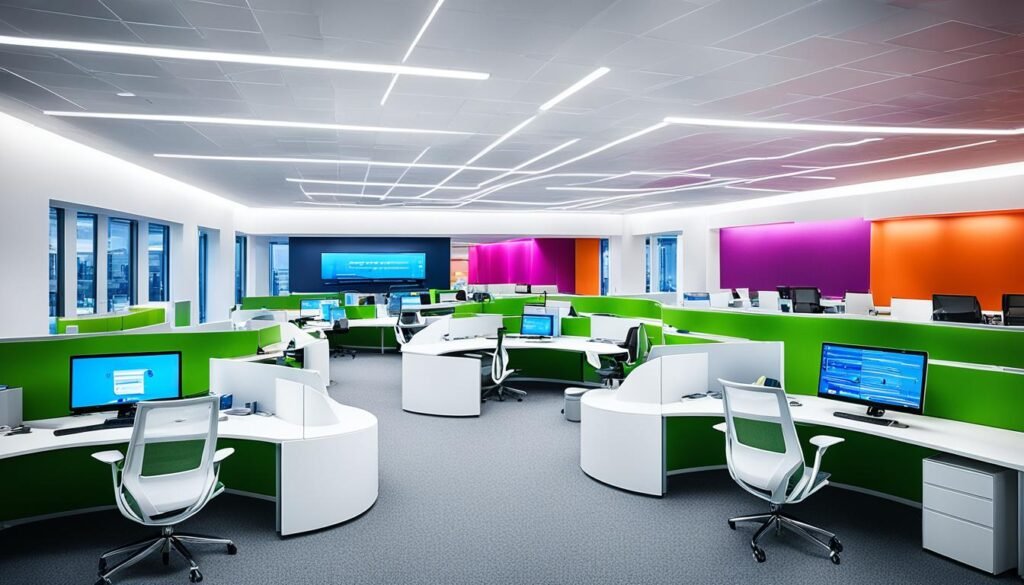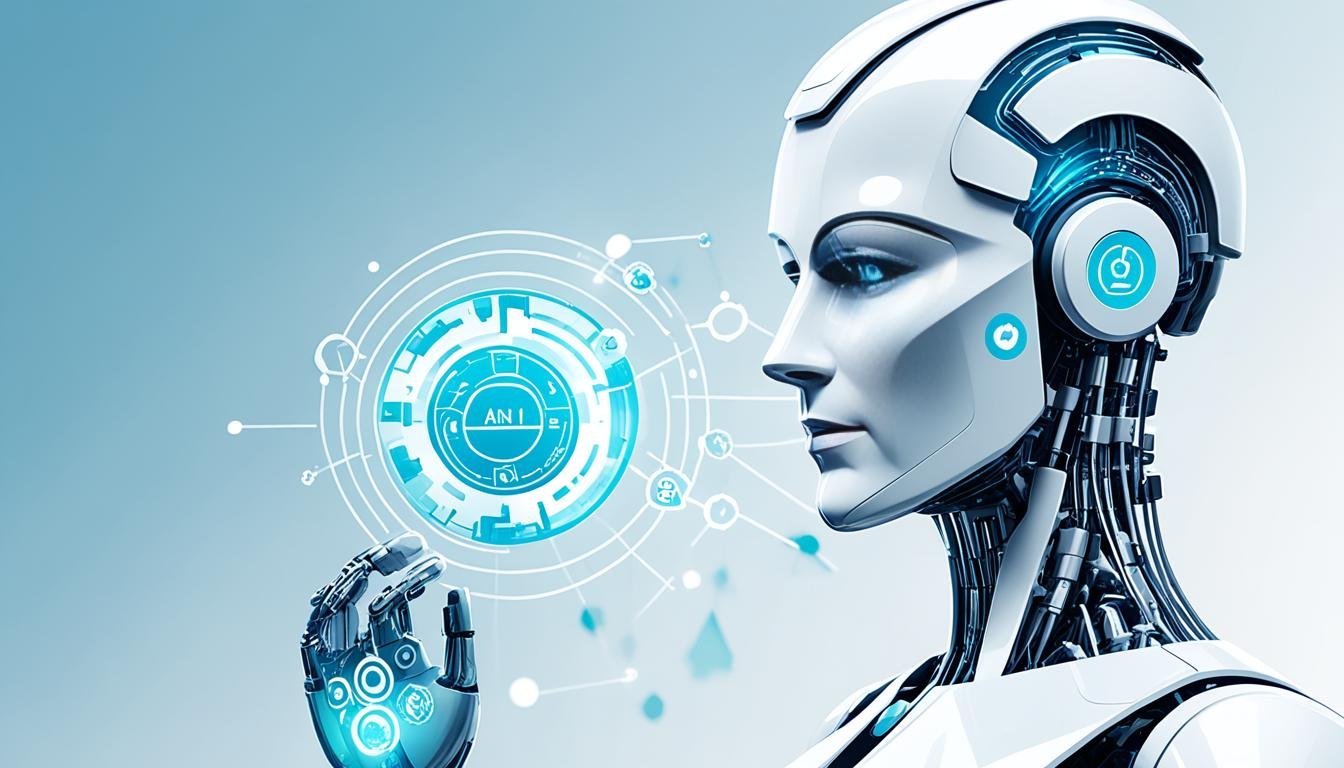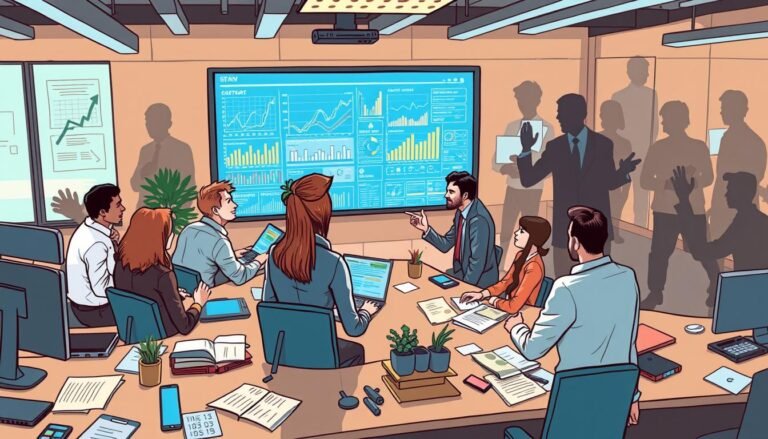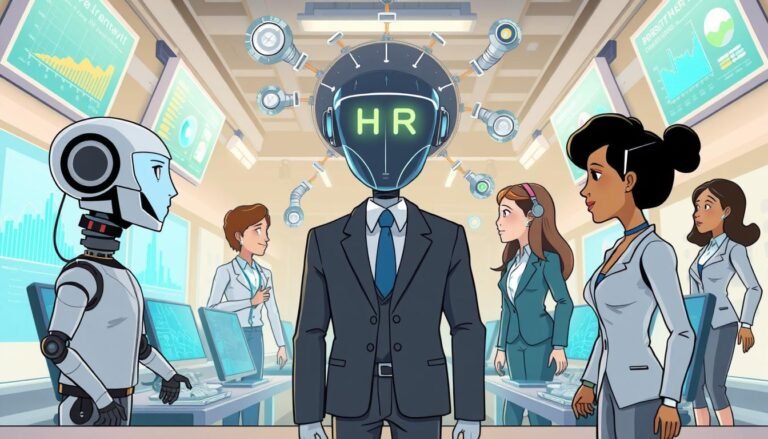What are the key trends in HR technology and automation in Ireland?
In Ireland, the HR sector is fast changing with tech and automation. The CIPD survey report for 2024 shows talent management and resourcing are key.
Businesses battle skills shortages especially in IT and leadership. They are adopting new recruitment and retention tactics. The rise of hybrid work and a competitive job market highlights the need for effective tech use. This is crucial for better HR processes and employee experience.
The push for HR automation in Ireland is big, influenced by major laws. These include the National Skills Strategy (2022-2025) and others. They make sure businesses follow safety and create good workplaces for well-being.
With the Equal Status Acts 1998-2021, diversity, equity, and inclusion are key. 50% of employers are now upskilling their teams. 46% are finding skilled workers. This prepares companies for the future with smart HR planning and digital change.
Introduction to HR Technology in Ireland
The CIPD’s 2024 report shines light on HR practices in Ireland and their changes. It notes Ireland’s fast adoption of HR technologies. 78% of organizations use HR tech to work smarter and boost productivity.
In the last five years, there was a big 35% increase in cloud-based HR tools. This move shows a trend towards more flexible and affordable solutions. AI and machine learning play a big role, helping 63% of HR teams with better hiring, engagement, and decision-making.
There’s a significant rise in mobile HR applications, up by 45%. They allow better remote work and keep operations smooth. Companies are also moving away from the yearly performance review. Instead, 70% now use continuous feedback, which has increased employee engagement and performance by 25%.
Talking about talent management, ATS has cut hiring times by half and boosted new hire quality by 30%. E-learning and virtual training have improved skills, with a 40% boost in what employees remember. Such tech makes learning and growing easier for everyone.
Additionally, 85% of Irish companies saw fewer HR tasks thanks to employee self-service portals. These portals are also key in keeping employees happy and staying at their jobs. They help in the fierce job market through better services.
Yet, there are also hurdles. Data security and privacy worries 45% of organizations, leading to more tech investments in security. Nonetheless, the better use of HR tech signals progress in Ireland. It sets businesses up for long-term success and staying ahead in their fields.
Digital Transformation in HR
The 2024 CIPD survey highlights how digital changes are key in Ireland’s HR. Companies are shifting to meet new expectations and improve hiring efforts. This makes digital transformation HR Ireland very important.
Impact on Talent Acquisition
Most firms, 91%, lack skilled workers in IT and leadership. So, recruitment technology Ireland is vital. There’s stiff competition to get these skilled people, as noted by 90% of businesses. Using tech helps HR find and attract talented individuals. This is critical in filling the skills gaps many companies are facing.
Streamlining HR Processes with Technology
With modern HR software Ireland, businesses can make HR tasks easier. They move from just managing paperwork to strategic work. The study found that tech and automation are the top forces changing HR. They boost efficiency and output.
With better digital systems, HR teams can do more important work. This helps build a dynamic, skilled workforce. This is key for Ireland to stay ahead in the global market.
The Role of AI in HR Automation
Artificial Intelligence is changing the game in HR automation in Ireland. It’s making decision-making smarter. A big number, 95%, of HR pros think AI could make hiring better. This would change how hiring works. ZAPP, a tool used by Recruit Island, is a great example of this change.
Predictive Analytics for Better Decision-Making
Predictive analytics tools in HR are a big help. They look at past data to guess future hiring needs. This makes finding talent more efficient. In Ireland, 50% of HR pros are on board with this. They’ve seen a 20% drop in people leaving their jobs. By spotting where there are not enough skills and who might leave, HR teams can put better plans in place.
AI-Powered Recruitment Tools
In Ireland, AI is making finding talent faster and more accurate. AI tools look at how candidates write and learn from this. They help check candidates faster. Also, chatbots and virtual helpers talk to candidates and help set up interviews. This makes candidates like talking to companies 75% more.
AI has also brought changes to the interview process. It ensures everyone is treated the same, making hires better. ATS is a tool that checks resumes automatically. It’s made the start of hiring 30% faster. This shows progress in making hiring fair for everyone.
HR Analytics: Driving Informed Decisions
In Ireland, the HR sector faces challenges like skills shortages. This makes HR analytics really important. Companies use data and strategies to make decisions that boost how they run and how happy their workers are.
Identifying Trends and Patterns
HR analytics lets companies spot workforce analytics trends. These trends give big clues about how employees act and what the company needs. In Ireland, for instance, 90% of people in a survey mentioned skills shortages in jobs that are key for operations. This shows a critical need for better talent management approaches.
Improving Employee Retention
In Ireland, many people change jobs often. This happens because they want better career chances or find the cost of living too high. HR analytics is key for companies to understand what makes employees stay. This helps in creating answers that stop them from leaving.
Take the example of managers not being well prepared for hybrid working. Training them better in this area could keep more employees happy at their job.
Emergence of Hybrid Work Models
In Ireland, businesses are embracing new ways of working. They are moving towards hybrid work models. This change is all about finding a good balance between work and life and meeting business goals. About 40% of Irish organizations are looking to use more hybrid work setups. Meanwhile, 13% are getting ready to fully switch to hybrid ways.
It’s getting tough for companies to keep good staff members. There is a 90% rise in companies trying to hire the same experienced people. About 77% of these companies are finding it hard to keep their employees. This shows the urgent need for flexible work options. Around 80% of businesses see that offering flexibility boosts how they attract and keep workers. It helps deal with tough economic times too.
Hybrid work models are also gaining ground because they support a healthy work-life balance. Things like burnout, feeling underappreciated, and bad management are making employees quit. This has pushed companies to be more flexible. A lack of workers on the frontline and in operations, noted by 37% of those asked, is another reason for this shift.
Teaching employees new skills is a key step, say 82% of those surveyed. This is especially important in fields that are growing fast, like technology and leadership. Many businesses in Ireland are facing a lack of needed skills. So, they are looking at hybrid work models as part of the solution.
Enhancing Employee Experience with Technology

In Ireland, companies are using new tech to make HR better. 67% of them use AI and Machine Learning. This leads to better, faster processes. And it makes employees happier and more involved.
Employee Self-Service Portals
94% of workers in Ireland use self-service HR platforms. These tools let them update their info easily. They can handle things like leave and pay info themselves. This makes HR’s job easier and makes work smoother for everyone.
Continuous Feedback Systems
Feedback systems in HR have changed how reviews work. They bring more talking and feedback all the time. Now, 17% more employees are really into their work. This change is good for learning and for working toward the same goals.
By using employee experience technology in Ireland, companies are getting and keeping great workers. They’re also going more by what the numbers say. 83% of HR decisions are now based on data. This tech shift is making work more dynamic and more fun for everyone.
Automation in Recruitment Technology
Recently, the way people get hired in Ireland has really changed. Now, high-tech tools are making the hiring process faster and better. They’re helping choose the right job candidates more quickly.
Applicant Tracking Systems (ATS)
Applicant Tracking Systems (ATS software) play a big role in Irish recruitment tech. They handle many job applications at once, using AI to sort resumes fast. This use of technology has been found to make hiring up to 50% more efficient, which is a big deal today.
Recruit Island’s ZAPP tech is a great example. It makes finding the right people quick and ensures they meet all the necessary checks. This saves time, while also making sure the new hires are exactly what’s needed.
Virtual Interview Platforms
Virtual hiring tools are key now, especially in a world where everyone can work from anywhere. They let companies talk to job candidates wherever they are. This means more people can apply, and it fits well with how work is changing.
AIs in interviews make things even smoother. They cut down interview times and help rate candidates fairly. AIs can even predict how well a person might do in a job, with 75% accuracy.
Virtual tools also make talking to companies easier for job seekers. They lead to 40% more happy candidates, all thanks to better and quicker talk times. So, companies in Ireland can find the best people from anywhere, making their teams stronger and more diverse.
To sum up, modern tech in hiring in Ireland is making everything better and more open. With great ATS and virtual tools, companies can stand out and find the best people in a competitive world.
Cost Efficiency through HR Automation
In Ireland, businesses look to automated HR systems to save money. These technologies cut down on manual work, errors, and reduce labor costs. This helps save a lot of money for companies.
When companies use HR automation, they become 25% more efficient. This is because automation makes work flow smoother, boosting overall productivity. Many Irish companies, about 60%, use cloud-based HR systems. This shows how popular and helpful they are.
A big advantage of HR automation is the clear ROI. By using these systems, businesses can invest more in growing their companies. A great example is how Applicant Tracking Systems (ATS) speed up hiring. They make recruiting faster, bringing in top talent quickly.
Using self-service portals boosts employee happiness by 15%. This shows that tech can make workers feel more satisfied. It means companies not only save money but also make their staff happier with modern tech.
So in Ireland, adopting HR automation is a smart move. It’s good for business and keeps the workplace running well. Companies see big returns and build more dynamic teams by using these tools.
The Future of Learning and Development
In Ireland, the way we learn and grow is changing. New tech trends are shaping how we tackle skill shortages. These shortages, felt by 91% of businesses, hurt operations and need for IT skills the most. To fix this, we’re looking at personalized learning programs and online tools. These help workers gain the skills they need.
Personalized Learning Paths
Custom training programs are key to filling skill gaps, especially in leadership. They’re voted as the biggest need by 36% of people. By teaching each person what they lack, businesses can boost their team’s skills fast. This helps them stay ahead. They also make learning a constant thing. This can cut down on staff quitting, which worries 77% of businesses.
Virtual Training Platforms
Online learning is changing how we train. It’s a mix of real learning and flexible video lessons. This matches how 40% of firms in Ireland are working now. With more people working from where they live, learning online is more important than ever. It helps attract and keep the best people. Plus, it makes lessons easy to come by, which can help businesses beat the global competition.
To wrap it up, using tech for personalized and online training is very important for Irish companies. It helps them beat skill shortages and makes staff happier. This, in turn, makes the business do better in a fast-changing world.
Diversity, Equity, and Inclusion (DEI) Initiatives
In Ireland, DEI initiatives are at the core of many HR strategies. Their goal is to build workplaces that are open to everyone and attract top talent. Companies see the value of welcoming all kinds of people to drive success and bring fresh ideas.
There’s a big need for skilled workers in areas like tech and healthcare. DEI practices make these companies more appealing to a wide range of candidates.
Addressing Unconscious Bias
DEI efforts focus on fighting unconscious bias. By hosting training programs, HR pros help workers spot and overcome their hidden prejudices. This means fairer treatment at work, which leads to a better and more productive environment.
But, despite these efforts, some companies are still struggling to see real change. The problem is often a lack of strong foundations for their DEI work.
Measuring DEI Progress
Keeping track of DEI goals is key to staying honest and open. HR teams are busy creating ways to see how they’re doing and find spots for growth. Today, only about 59% of HR leaders use detailed “people analytics,” leaving lots of room for improvement.
Good tracking of DEI means companies can keep their promises. It also helps them get better at being fair and welcoming to all.








